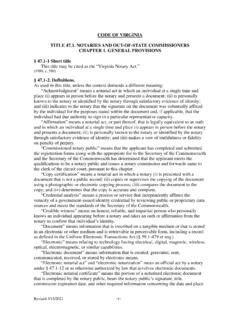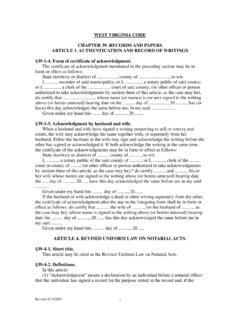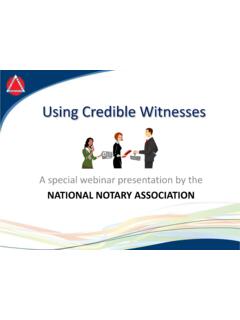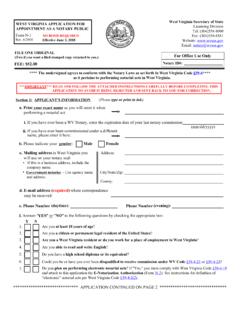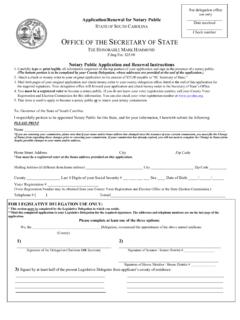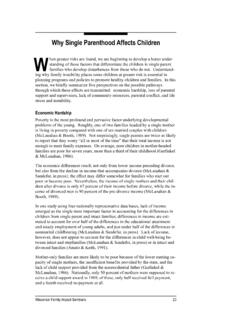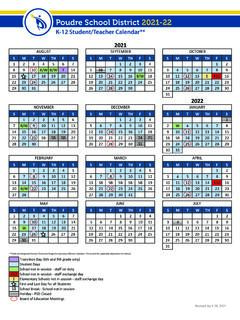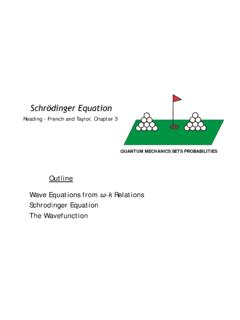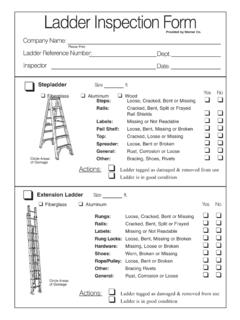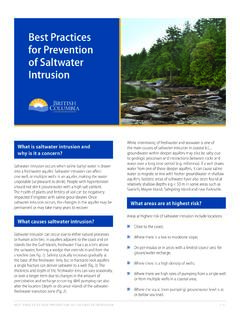Transcription of THE NOTARY PUBLIC CODE OF PROFESSIONAL RESPONSIBILITY
1 The NOTARY PUBLIC Code of PROFESSIONAL RESPONSIBILITY of (800) 876-6827 THE NOTARY PUBLIC CODE OF PROFESSIONAL RESPONSIBILITYOF 2020 Published as a PUBLIC Service by: national NOTARY Association9350 De Soto AvenueChatsworth, CA 91311-4926 Telephone: (818) 739-4000 Fax: (818) 700-0920 Website: : of ContentsTable of ContentsIntroduction ..ixDefinitions ..xiiiThe Guiding Principles ..1 Guiding Principle I ..3 Article A: Refusal to Notarize ..3I-A-1: Refusal Without Due Cause Improper ..3I-A-2: Refusal for After Hours Services ..3I-A-3: Refusal on Reasonable Grounds ..4I-A-4: Discriminatory Refusal Improper ..4I-A-5: Discretionary Refusal ..4 Article B: Fees ..5I-B-1: Discriminatory Assessment of Fee Improper ..5I-B-2: Reducing or Waiving Fee ..5 Article C: Dignity and Professionalism of Office ..5I-C-1: Conduct of PUBLIC Officer.
2 5 Article D: Advertising and Endorsement ..6I-D-1: Misrepresentation : Endorsement Improper ..6 Article E: Ability and Availability to Serve ..6I-E-1: Physical Impairment ..6 The NOTARY PUBLIC Code of PROFESSIONAL RESPONSIBILITY of 2020ivI-E-2: Lack of Knowledge ..7I-E-3: Change of Information ..7 Guiding Principle II ..13 Article A: Proper and Improper Gain ..13II-A-1: Associated Charges ..13II-A-2: Actual or Potential Gain Improper ..13II-A-3: Gift, Gratuity, or Donation Improper ..14II-A-4: Commission or Fee Improper ..14II-A-5: Employee Remuneration Improper ..14 Article B: Other Conflicts of Interest ..15II-B-1: NOTARY s Signature a Conflict ..15II-B-2: NOTARY s Co-Signature a Conflict ..15II-B-3: Document Naming NOTARY a Conflict ..15II-B-4: Personal Document a Conflict ..15II-B-5: Document of Relative a Conflict.
3 16 Article C: Appearance of Partiality ..16II-C-1: Compromise of Impartiality ..16II-C-2: Exertion of Influence Improper ..16 Guiding Principle III ..21 Article A: Personal Appearance ..21 III-A-1: Physical Appearance ..21 III-A-2: Remote Online Notarizations ..21 Article B: Identification ..22 III-B-1: High Degree of Care ..22 III-B-2: Personal Knowledge ..22 Article C: Willingness and Mental Competence ..22 III-C-1: Free and Voluntary Act Essential ..22 III-C-2: Mental Competence Essential ..23vTable of ContentsIII-C-3: Coherent Communication Essential ..23 III-C-4: Direct Communication Essential ..23 Article D: Individuals with Physical Disabilities ..24 III-D-1: Reasonable Accommodations ..24 III-D-2: Signature by Mark or Proxy ..24 III-D-3: Applicability of Certain Standards ..24 Guiding Principle IV.
4 31 Article A: Certificate Completion ..31IV-A-1: Notarial Wording Required ..31IV-A-2: Completion by NOTARY ..31IV-A-3: Completion Contemporaneous with Act ..32 Article B: Fraudulent Certificate ..32IV-B-1: False Statement Improper ..32IV-B-2: False Date Improper ..32 Article C: Security of Certificate ..33IV-C-1: Fraud-Deterrent : Attachment by Another Improper ..33IV-C-3: Tamper-Evident Technology ..34 Article D: Potentially Fraudulent Documents ..34IV-D-1: Incomplete Document ..34IV-D-2: Signature Subject to Notarization ..34 Article E: Fraudulent Notarizations or Transactions ..35IV-E-1: Improper Notarization ..35IV-E-2: Improper Document or Transaction ..35IV-E-3: Reporting Illegality ..35 Guiding Principle A: Due Care and Diligence ..41V-A-1: Reasonable Care ..41 The NOTARY PUBLIC Code of PROFESSIONAL RESPONSIBILITY of 2020viArticle B: Unauthorized Advice.
5 41V-B-1: Legal Counseling Improper ..41V-B-2: Selecting Notarial Act or Certificate Improper ..42V-B-3: Selecting Document Improper ..42V-B-4: Preparing Document Improper ..42 Article C: Unauthorized Services ..43V-C-1: Improper Copy : Certifying Photograph Improper ..43V-C-3: Certifying Translation Improper ..43 Guiding Principle VI ..49 Article A: Official Seal ..49VI-A-1: Use of Official Seal ..49VI-A-2: Delegation of Official Seal B: Control and Disposition of Official Seal ..50VI-B-1: Safeguarding Official Seal ..50VI-B-2: Surrendering Official Seal to Employer Improper ..50VI-B-3: Destruction or Disablement of Official Seal ..50 Guiding Principle VII ..53 Article A: Record of Notarial Acts ..53 VII-A-1: Official Act ..53 VII-A-2: Refused Act ..53 VII-A-3: Format of Journal ..54 VII-A-4: Essential Journal Entries.
6 54 VII-A-5: Additional Journal Entries ..55 VII-A-6: Entry Contemporaneous with Act ..55 VII-A-7: Backup of Electronic Journal ..55 Article B: Control and Disposition of : Safeguarding Journal ..56viiTable of ContentsVII-B-2: Surrendering Journal to Employer Improper ..56 VII-B-3: Storage of Journal ..56 Guiding Principle VIII ..61 Article A: Review of Documents ..61 VIII-A-1: Examining Text ..61 VIII-A-2: Extracting or Copying Information Improper ..61 Article B: Journal of Notarial Acts ..62 VIII-B-1: Recording Personal Information in Journal : Access to Journal Entries ..62 VIII-B-3: Record of Access ..63 Article C: Exposure of Information ..63 VIII-C-1: Revealing Particulars of Notarial Act Improper ..63 VIII-C-2: Sale or Personal Use of Information Improper ..63 Guiding Principle A: Precedence of Law.
7 67IX-A-1: Following Statutes and Rules ..67IX-A-2: Following Court Decisions ..67IX-A-3: Waiving Legal Requirement Improper ..68IX-A-4: Commission of Employee ..68 Article B: Official Guidelines ..68IX-B-1: Following Official Guidelines ..68 Article C: Practice Standards ..69IX-C-1: Following Code of PROFESSIONAL RESPONSIBILITY ..69IX-C-2: Other Practice Standards ..69 Guiding Principle X ..73 Article A: RESPONSIBILITY to Seek Knowledge ..73X-A-1: Studying Statutes and Regulations ..73X-A-2: Studying Official Guidelines ..73 The NOTARY PUBLIC Code of PROFESSIONAL RESPONSIBILITY of 2020viiiX-A-3: Seeking Supplemental : Keeping Current on New Developments ..74 Article B: RESPONSIBILITY to Maintain Standards ..74X-B-1: Reporting Misconduct ..74 Revision Commission ..77ixIntroductionIntroductionPURPOSE OF THE CODEThe NOTARY PUBLIC s key role in lending integrity to important transactions of commerce and law necessitates sound standards for the performance of notarial occupations pose PROFESSIONAL norms for their practitioners, such as the Code of PROFESSIONAL Conduct and Generally Accepted Accounting Principles for certified PUBLIC accountants.
8 The purpose of The NOTARY PUBLIC Code of PROFESSIONAL RESPONSIBILITY is to pro-mote recognized standards of PROFESSIONAL practice for Notaries PUBLIC of the United States to follow in performing notarial standards in this Code are of two types. The majority are principles, policies, and practices that have proven over the years to be effective in protecting documents and trans-actions from forgery and fraud. The remainder are standards which assert that as PUBLIC officers Notaries must serve all persons equally, without regard to such distinctions as race, nationality, ethnicity, citizenship, religion, politics, lifestyle, advanced age, physical disability, gender, or sexual the acts of Notaries affect individual rights and property under both civil and crim-inal law, it is imperative that PROFESSIONAL standards for Notaries be widely acknowledged as just, fair, and well-developed.
9 To that end, the standards in this Code were drafted with input from representatives of occupational fields with a large constituency of Notaries PUBLIC . Also contributing were state and local officials who regulate the activities of Notaries, as well as legal, business, and surety OF THE CODEThis Code of PROFESSIONAL RESPONSIBILITY is based upon 10 widely accepted Guiding Principles that clarify the multiple roles of the NOTARY PUBLIC in the United States. They are general rules for responsible Guiding Principle in turn embraces particular Standards of PROFESSIONAL Practice that are arranged under several Articles. The Articles identify the broader practice areas under which the individual Standards are NOTARY PUBLIC Code of PROFESSIONAL RESPONSIBILITY of 2020xThe Standards of PROFESSIONAL Practice are exemplified by Illustrations posing problematic situations that are common or typical for Notaries.
10 Details are provided to help the reader visualize each each Illustration, the Resolution indicates the course of action best exemplifying the applicable Guiding Principle and Standard of PROFESSIONAL Commentary sections supplement the Code by explaining the drafters views, concerns, and rationales in shaping important provisions, and by discussing certain other matters not directly addressed by the OF THE CODEThe Guiding Principles and Standards of PROFESSIONAL Practice reflect the relevance, evolu-tion, and progress of the office of NOTARY PUBLIC in the United States over nearly 250 Principles and Standards reflect the conviction that Notaries must operate in a busi-nesslike fashion, basing their actions on proven standards of practice, and always carefully documenting their official REQUIREMENTS AND THE CODEIn many jurisdictions, a particular Standard of PROFESSIONAL Practice may already be rec-ognized in a statute or administrative rule, such as the common but not universal legal mandate to keep a record of all notarial acts performed.

